Dec 14, 2025
Dec 14, 2025
Director: Costa-Gavras /France& Algeria/French/127 mts
This landmark 1969 film of Constantin Costa-Gavras about a political confusion caused by a murder of a politic won both the New York Film Critics Circle Award and the Oscar for Best Foreign Film the same year. In the wake of the John and Robert Kennedy and Martin Luther King assassinations of the 1960s and fueled by the later Watergate scandal, the film had tremendous resonance with American audiences, becoming one of the highest grossing foreign language films ever released in that market.
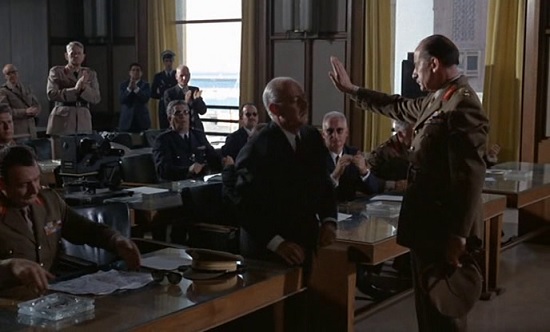
The opening Scene: The Government lecture by the leader of security force
On 22 May 1963, after speaking at an anti-nuclear rally in Salonika, the charismatic Greek deputy Grigoris Lambrakis was clubbed to death in the street. The conservative government described the event as “an unfortunate traffic accident,” but following protests from the opposition leader, George Papandreou, a young examining magistrate was appointed to investigate the incident. Contrary to government expectations the magistrate refused to be manipulated and the intended cover-up became an embarrassing revelation: Lambrakis had been murdered by an extreme right-wing organization sanctioned by the authorities. Key witnesses began to disappear, and the deepening scandal eventually brought down the Karamanlis government. The Centre Left under George Papandreou came to office, but the king discharged his government, and on 21 April 1967 the military seized power. The examining magistrate was relieved of his responsibilities and strict censorship imposed.
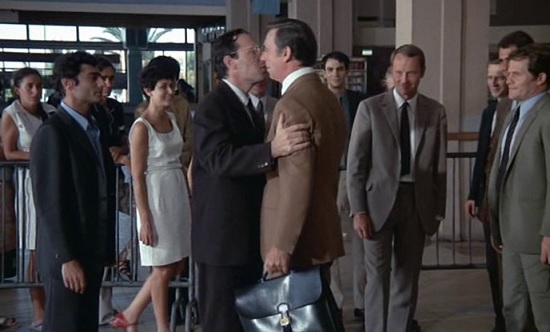
The Deputy Grigoris Lambrakis being received at the airport by associates
The above chilling facts form the basis for Costa-Gavras’s gripping political thriller Z. His narrative comes not directly from the investigation, but from the novel by Vassilis Vassilikos, a Lambrakis follower, who was given access to the evidence during the brief period of Centre Left rule. Published in 1966, the novel ends with the trial of the conspirators, but Costa-Gavras, benefiting from historical hindsight, extends his version to include the military coup.
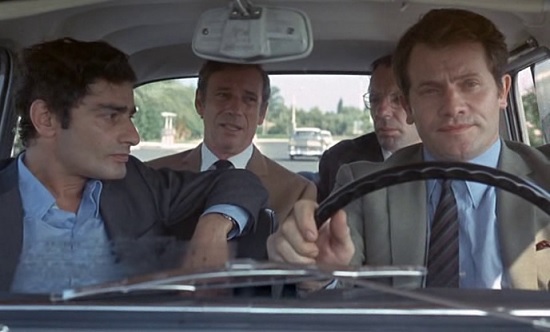
The deputy is being driven to the hall where he is planned to give speech
For his adaptation, Costa-Gavras sought the collaboration of Jorge Semprun who had previously worked with Resnais on La guerre est finie. The flashbacks providing background to the protagonists or exposing government manipulation are characteristic of Semprun’s organizing strategies. To produce a taut, fast-moving film narrative, the filmmaker discarded the novel’s philosophical and reflective passages and reduced the range of characters, so that the journalist/photographer, for example, is a composite of several reporters. The dialogue has also been pared down, though some contemporary allusions to the May 1968 events in Paris have been added. As a result, ‘Z’ is engaging and fast paced without a lull moment.
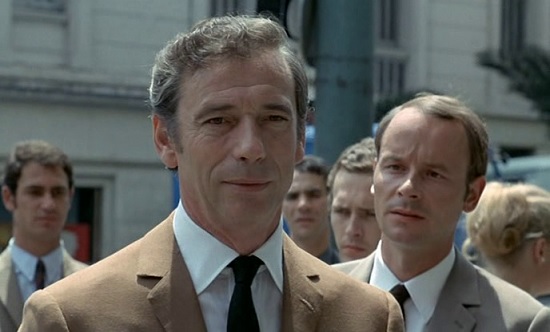
Grigoris Lambrakis (Yves Montand): Democratic leader of opposition
The location of the action is never expressly stated (filming took place primarily in Algiers), but there are hints (such as the newspaper that The Deputy reads, which is Ta Nea, advertisements for Fix Hellas, one of the four well-known brands of Greek beer, characters are drinking Alpha and Fix beers through the movie, Greek can be heard in the background and there is a picture of Aliki Vougiouklaki, a famous Greek actress, in one of the taverns) that it is Greece in the early 1960s. In another scene of the film a picture of Pablo Picasso’s famous sketch “The Man with the carnation” is displayed in a wall. The man with the carnation was Nicos Beloyannis a prominent figure of the Greek Communist Party who has been sentenced to death a few years earlier. Furthermore, in the opening credits there is a mock disclaimer which reads (in translation): “Any resemblance to real events, to persons dead or living, is not accidental. It is intentional.”
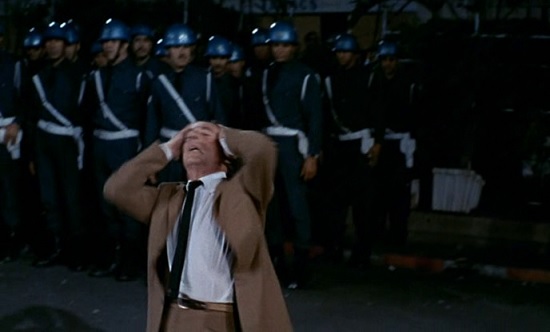
The scene of crime when the Deputy was hit on his head
The story begins with the closing moments of a rather dull government lecture and slide show on agricultural policy, after which the leader of the security police of a right-wing military-dominated government (Dux) takes over the podium for an impassioned speech describing the government's program to combat leftism, using the metaphors of “a mildew of the mind”, an infiltration of “isms”, or “sunspots”.
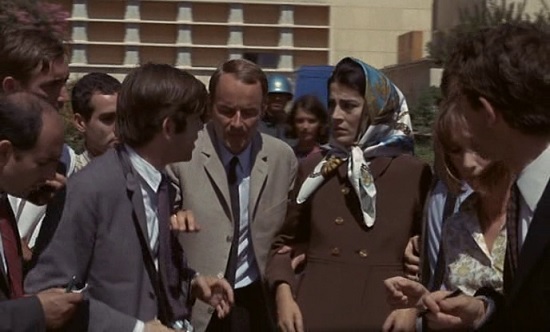
Helene (actress Irene Papas), the Deputy’s wife, arriving at hospital
The scene shifts to preparations for a rally of the opposition faction where the Deputy (Montand) is to give a speech advocating nuclear disarmament. It is obvious that there have been attempts to prevent the speech’s delivery. The venue has been changed to a much smaller hall and logistical problems have appeared out of nowhere. As the Deputy crosses the street from the hall after giving his speech, a delivery truck speeds past him and a man on the open truck bed strikes him down with a club. The injury eventually proves fatal, and by that time it is already clear to the viewer that the police have manipulated witnesses to force the conclusion that the victim was simply run over by a drunk driver.
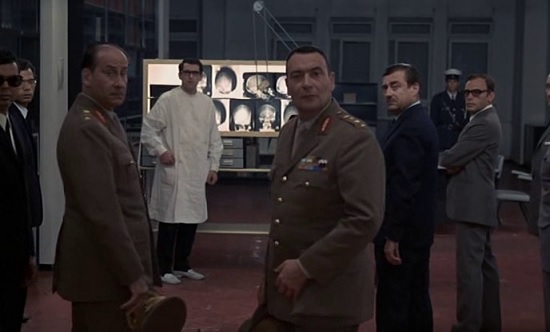
General Dux (left) and his coterie with the doctor when Helene arrives
However, they do not control the hospital, where the autopsy disproves their interpretation. The examining magistrate (Trintignant), with the assistance of a photojournalist (Perrin), now uncovers sufficient evidence to indict not only the two right-wing militants who committed the murder, but also four high-ranking military police officers. The action of the film concludes with one of the Deputy's associates rushing to see the Deputy’s widow (Papas) to give her the surprising news of the officers’ indictments.
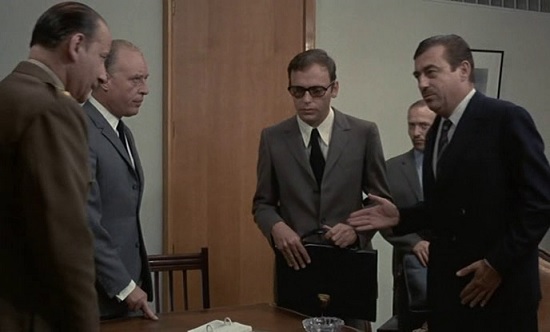
The Colonel (Right) introduces the investigating Magistrate (Trintignant)
An epilogue provides a synopsis of the subsequent turns of events. Instead of the expected positive outcome, the prosecutor is mysteriously removed from the case, key witnesses die under suspicious circumstances, the assassins receive (relatively) short sentences, the officers receive only administrative reprimands, the Deputy’s close associates die or are deported, and the photojournalist is sent to prison for disclosing official documents.
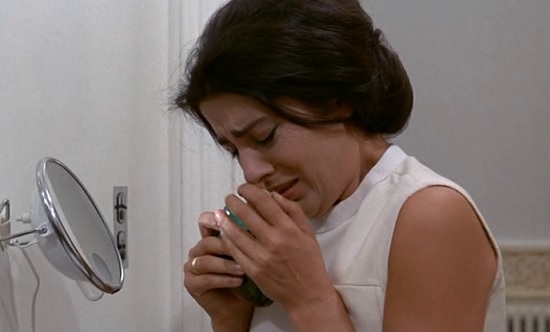
Helene holding her husband's perfume: A desperate moment after his death
As the closing credits roll, before listing the cast and crew, the filmmakers first list the things banned by the junta. They include: peace movements, strikes, labor unions, long hair on men, The Beatles, other modern and popular music (“la musique populaire”), Sophocles, Leo Tolstoy, Aeschylus, writing that Socrates was homosexual, Eugène Ionesco, Jean-Paul Sartre, Anton Chekhov, Harold Pinter, Edward Albee, Mark Twain, Samuel Beckett, Trotsky, the bar association, sociology, international encyclopedias, free press, and new math. Also banned is the letter Z, which was used as a symbolic reminder that Grigoris Lambrakis and by extension the spirit of resistance lives (zi = “he (Lambrakis) lives”).
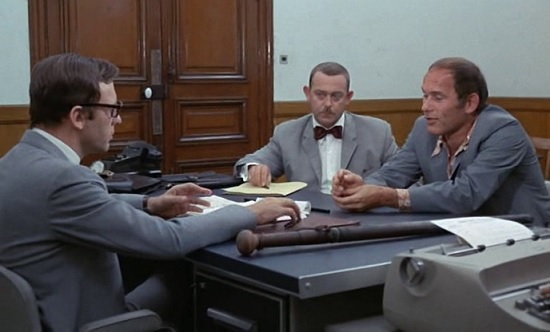
Investigating Magistrate taking evidence form a thug involved in the crime
What made “Z” so different from its immediate forebear, Gillo Pontecorvo's 1966 “Battle of Algiers,” was Costa-Gavras’ ease with genre filmmaking in a current-events context. After the assassination there’s a chase scene as nerve-wracking as anything on screen in 1969, and it's followed by a skillful, suspenseful procedural drama. The thugs (Marcel Bozzuffi and Renato Salvatori) are eminently hissable villains.
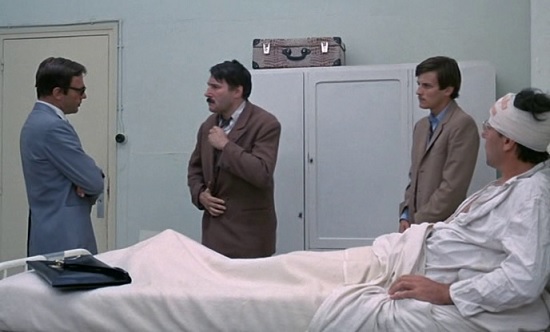 Magistrate confronting an accused at the hospital
Magistrate confronting an accused at the hospital
Best of all, the journey of the unnamed magistrate (brilliantly acted by Jean-Louis Trintignant for which he won best actor award at Cannes film festival), blandly impartial behind his thick glasses, is worthy of Hollywood heroes like Henry Fonda. When the magistrate finally, almost accidentally refers to the politician’s death as a “murder,” you can feel the movie’s moral universe shift on its axis.
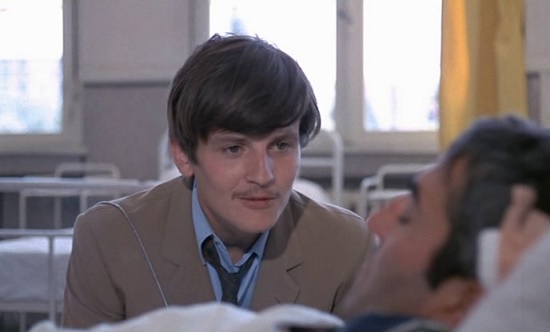
The cameraman secretly collects information from an accused
Central to the film’s narrative strategy is the editing process. Each witness pwill give a subjective account of events, set against a narrative flashback, to provide a further piece in the jigsaw. As false witnesses parrot their prepared statements, betraying themselves by the too-often repeated phrase “supple and ferocious like a tiger,” there is a revealing disjuncture between speaker and image. Again, parallel editing juxtaposes the sentiments of the peace rally with the mob violence outside. Finally, repeated flashbacks of the murdered deputy create a sense of his immanence, thus providing a visual metaphor for the meaning of the Greek word “Z”: “he still lives.”
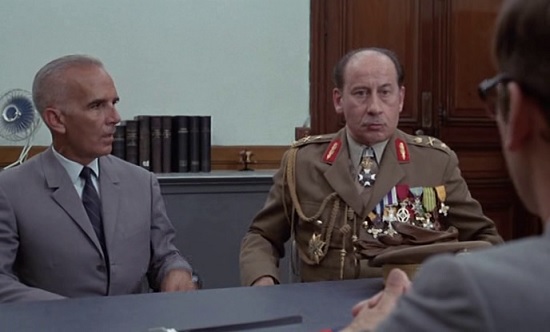
The Villain General Dux is accused of political murder
Z is one of the most politically insightful films ever made, exposing government hypocrisy and cover-up in the wake of a political assassination. It is a delightful, thrilling and marvelous masterpiece. The message is deliciously electrifying and the ending is absolutely superlative!
A series of “Hundred Favorite Films Forever”
13-Mar-2013
More by : P. G. R. Nair